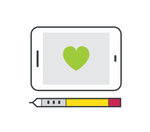
Happy Not Perfect: Upgrade Your Mind, Challenge Your Thoughts, and Free Yourself from Anxiety |
|
|---|---|
| Authors: | Jamie, Poppy |
| Publisher: | Potter/Ten Speed/Harmony/Rodale, Harmony/Rodale, Harmony Rodale |
| BISAC/Subject: | SEL016000, OCC010000, SEL024000, SEL011000 |
| ISBN: | 9780593231692, Related ISBNs: 0593231694, 9780593231692, 0593231686, 9780593231685, 0593348680 |
| Classification: | Non-Fiction |
| Number of pages: | 288, |
| Audience: | General/trade |
Synopsis: A clear path to overcoming uncertainty, perfectionism, and fears of rejection so you can finally find peace with the past and create a happier, healthier future
“Poppy’s powerful approach will help you take control of your thoughts so they don’t control you.”—Lori Gottlieb, New York Times bestselling author of Maybe You Should Talk to Someone
Even before the pandemic brought on a crushing wave of stress, anxiety, isolation, life change, and financial struggle, there was already a growing mental health crisis. Due to a culture that encourages perfection, hustle, and fictional life/work balance, many are burning out. Behind her Instagram-projected image of “happy wellness founder,” Poppy Jamie was also struggling mightily with perfectionism and life purpose.
She began working with mental health experts and researchers to find practical tools to overcome her inner critic and rewire her mind. She discovered that it is possible to create new neural pathways in your brain to break patterns of avoidance, challenge fears of not being good enough, and turn failure around by stretching the mind with new, healthier thought habits. The old wiring (and habits) that you’ve been stuck with can be written-over. You can actually upgrade your headspace to make curiosity, vulnerability, compassion, and emotional flexibility your default settings.
In the emphatic and trusted voice of Bridget Jones meets neuroscience, Poppy shares her Flexy Thoughts approach for changing how you react to emotional triggers and think of yourself while improving your mental and physical health, relationships, and vision of the future.
Our emotional resilience may continue to be tested, but the new perspectives and strategies in Happy Not Perfect will help us bring confidence, adaptability, and acceptance to whatever comes next.
“Poppy’s powerful approach will help you take control of your thoughts so they don’t control you.”—Lori Gottlieb, New York Times bestselling author of Maybe You Should Talk to Someone
Even before the pandemic brought on a crushing wave of stress, anxiety, isolation, life change, and financial struggle, there was already a growing mental health crisis. Due to a culture that encourages perfection, hustle, and fictional life/work balance, many are burning out. Behind her Instagram-projected image of “happy wellness founder,” Poppy Jamie was also struggling mightily with perfectionism and life purpose.
She began working with mental health experts and researchers to find practical tools to overcome her inner critic and rewire her mind. She discovered that it is possible to create new neural pathways in your brain to break patterns of avoidance, challenge fears of not being good enough, and turn failure around by stretching the mind with new, healthier thought habits. The old wiring (and habits) that you’ve been stuck with can be written-over. You can actually upgrade your headspace to make curiosity, vulnerability, compassion, and emotional flexibility your default settings.
In the emphatic and trusted voice of Bridget Jones meets neuroscience, Poppy shares her Flexy Thoughts approach for changing how you react to emotional triggers and think of yourself while improving your mental and physical health, relationships, and vision of the future.
Our emotional resilience may continue to be tested, but the new perspectives and strategies in Happy Not Perfect will help us bring confidence, adaptability, and acceptance to whatever comes next.
LightSail includes up to 6,000 high interest, LexileⓇ aligned book titles with every student subscription. Other titles are available for individual purchase.
SUPPORT GROWING READERS

Immediately Engage Students
Simple intuitive design has classrooms reading within minutes.

Exponentially Grow Reading Time
Students love the LightSail experience and naturally spend more time reading.

Accelerate Literacy Development
Students reading 25 minutes a day on LightSail are seeing 2+ years of Lexile growth in a single year.
LightSail Education is a comprehensive LexileⓇ and standards-aligned, literacy platform and digital e-book library. Including multimodal learning functionality and featuring books from leading publishers, LightSail holistically assesses and nurtures each student on their reading and writing-to-learn journey, throughout elementary, middle, and high school.
*LightSail offers a 2,000 or a 6,000 title bundle with its student subscriptions. Other titles are available for individual purchase.



